- Clone
- 16-10A1 (See other available formats)
- Regulatory Status
- RUO
- Other Names
- B7-1, B7, Ly-53
- Isotype
- Armenian Hamster IgG
- Ave. Rating
- Submit a Review
- Product Citations
- publications
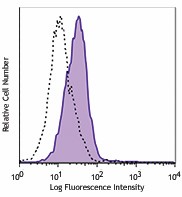
-

LPS-stimulated (3 days) BALB/c splenocytes stained with LEAF™ purified CD80 (clone 16-10A1, filled histrogram) or Armenian hamster IgG isotype control (open histogram), followed by anti-Armenian hamster IgG PE.
CD80 is a 60 kD highly glycosylated protein. It is a member of the Ig superfamily and is also known as B7-1, B7, and Ly-53. CD80 is constitutively expressed on dendritic cells and monocytes/macrophages, and inducibly expressed on activated B and T cells. The ligation of CD28 on T cells with CD80 and CD86 (B7-2) on antigen presenting cells (such as dendritic cells, macrophages, and B cells) elicits co-stimulation of T cells resulting in enhanced cell activation, proliferation, and cytokine production. CD80 appears to be expressed later in the immune response than CD86. CD80 can also bind to CD152, also known as CTLA-4, to deliver an inhibitory signal to T cells.
Product DetailsProduct Details
- Verified Reactivity
- Mouse
- Reported Reactivity
- Dog
- Antibody Type
- Monoclonal
- Host Species
- Armenian Hamster
- Immunogen
- CHO cell line transfected with mouse B7 (CD80)
- Formulation
- 0.2 µm filtered in phosphate-buffered solution, pH 7.2, containing no preservative.
- Endotoxin Level
- Less than 0.01 EU/µg of the protein (< 0.001 ng/µg of the protein) as determined by the LAL test.
- Preparation
- The Ultra-LEAF™ (Low Endotoxin, Azide-Free) antibody was purified by affinity chromatography.
- Concentration
- The antibody is bottled at the concentration indicated on the vial, typically between 2 mg/mL and 3 mg/mL. Older lots may have also been bottled at 1 mg/mL. To obtain lot-specific concentration and expiration, please enter the lot number in our Certificate of Analysis online tool.
- Storage & Handling
- The antibody solution should be stored undiluted between 2°C and 8°C. This Ultra-LEAF™ solution contains no preservative; handle under aseptic conditions.
- Application
-
FC - Quality tested
Block, IHC-F, IP - Reported in the literature, not verified in house - Recommended Usage
-
Each lot of this antibody is quality control tested by immunofluorescent staining with flow cytometric analysis. For flow cytometric staining, the suggested use of this reagent is ≤ 1.0 µg per million cells in 100 µl volume. It is recommended that the reagent be titrated for optimal performance for each application.
- Application Notes
-
Additional reported applications (for the relevant formats) include: immunoprecipitation2, in vitro and in vivo blocking of CTLA-4 Ig to CD80 by blocking costimulation of T cells by activated B cells2-4, and immunohistochemical staining of acetone-fixed frozen sections1,4. The Ultra-LEAF™ purified antibody (Endotoxin < 0.01 EU/µg, Azide-Free, 0.2 µm filtered) is recommended for functional assays (Cat. Nos. 104747-104752).
-
Application References
(PubMed link indicates BioLegend citation) -
- Harlan DM, et al. 1994. P. Natl. Acad. Sci. USA 91:3137. (IHC)
- Razi-Wolf Z, et al. 1992. P. Natl. Acad. Sci. USA 89:4210. (Block, IP)
- Hathcock KS, et al. 1994. J. Exp. Med. 180:631. (Block)
- Herold KC, et al. 1997. J. Immunol. 158:984. (Block, IHC)
- Ma XT, et al. 2006. Cancer Res. 66:1169.
- Andoniou CE, et al. 2005. Nature Immunology 6:1011. (FC)
- Lawson BR, et al. 2007. J. Immunol. 178:5366.
- Turnquist HR, et al. 2007. J. Immunol. 178:7018.
- Misra RS, et al. 2010. J. Exp Med. 207:1775. PubMed
- del Rio ML, et al. 2011. Transpl. Int. 24:501. (FC) PubMed
- Philipsen L, et al. 2013. Mol Cell Proteomics. 12:2551. PubMed
- RRID
-
AB_2819806 (BioLegend Cat. No. 104752)
AB_2819804 (BioLegend Cat. No. 104750)
AB_2819805 (BioLegend Cat. No. 104751)
AB_2819801 (BioLegend Cat. No. 104747)
AB_2819802 (BioLegend Cat. No. 104748)
AB_2819803 (BioLegend Cat. No. 104749)
Antigen Details
- Structure
- Ig superfamily, 60 kD
- Distribution
-
Macrophages, activated B cells and T cells, dendritic cells
- Function
- T cell costimulation
- Ligand/Receptor
- CD28 (stimulatory), CD152(CTLA4) (inhibitory)
- Cell Type
- B cells, Dendritic cells, Macrophages, T cells, Tregs
- Biology Area
- Cell Biology, Costimulatory Molecules, Immunology, Neuroscience, Neuroscience Cell Markers
- Molecular Family
- CD Molecules, Immune Checkpoint Receptors
- Antigen References
-
1. Barclay AN, et al. 1997. The Leukocyte Antigen FactsBook Academic Press.
2. Linsley PS, et al. 1991. J. Exp. Med. 174:561.
3. Salomon B, et al. 2001. Annu. Rev. Immunol. 19:225. - Gene ID
- 12519 View all products for this Gene ID
- UniProt
- View information about CD80 on UniProt.org
Related FAQs
- Do you guarantee that your antibodies are totally pathogen free?
-
BioLegend does not test for pathogens in-house aside from the GoInVivo™ product line. However, upon request, this can be tested on a custom basis with an outside, independent laboratory.
- Does BioLegend test each Ultra-LEAF™ antibody by functional assay?
-
No, BioLegend does not test Ultra-LEAF™ antibodies by functional assays unless otherwise indicated. Due to the possible complexities and variations of uses of biofunctional antibodies in different assays and because of the large product portfolio, BioLegend does not currently perform functional assays as a routine QC for the antibodies. However, we do provide references in which the antibodies were used for functional assays and we do perform QC to verify the specificity and quality of the antibody based on our strict specification criteria.
- Does BioLegend test each Ultra-LEAF™ antibody for potential pathogens?
-
No, BioLegend does not test for pathogens in-house unless otherwise indicated. However, we can recommend an outside vendor to perform this testing as needed.
- Have you tested this Ultra-LEAF™ antibody for in vivo or in vitro applications?
-
We don't test our antibodies for in vivo or in vitro applications unless otherwise indicated. Depending on the product, the TDS may describe literature supporting usage of a particular product for bioassay. It may be best to further consult the literature to find clone specific information.
Other Formats
View All CD80 Reagents Request Custom ConjugationCustomers Also Purchased
Compare Data Across All Formats
This data display is provided for general comparisons between formats.
Your actual data may vary due to variations in samples, target cells, instruments and their settings, staining conditions, and other factors.
If you need assistance with selecting the best format contact our expert technical support team.
-
Biotin anti-mouse CD80
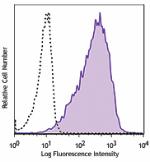
LPS-stimulated (3 days) BALB/c splenocytes were stained with... -
FITC anti-mouse CD80
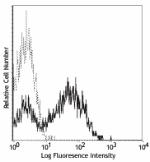
LPS-stimulated (3 days) BALB/c splenocytes stained with 16-1... -
PE anti-mouse CD80
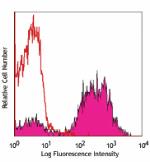
Thioglycolate-elicited Balb/c mouse peritoneal macrophages s... -
Purified anti-mouse CD80
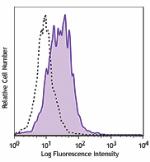
LPS-stimulated (3 days) BALB/c splenocytes stained with puri... -
PE/Cyanine5 anti-mouse CD80
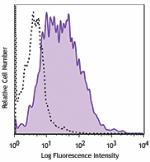
LPS-stimulated (3 days) BALB/c splenocytes were stained with... -
APC anti-mouse CD80
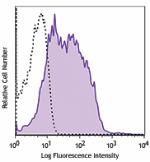
LPS-stimulated (3 days) BALB/c splenocytes were stained with... -
Alexa Fluor® 488 anti-mouse CD80
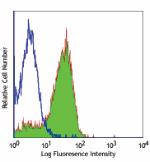
Thioglycolate-elicited Balb/c mouse peritoneal macrophages s... -
Alexa Fluor® 647 anti-mouse CD80
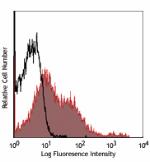
LPS-stimulated (day-3) C57BL/6 mouse splenocytes stained wit... 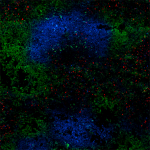
1 week 4T1 cells (mouse breast cancer cell line) induced BAL... -
PerCP/Cyanine5.5 anti-mouse CD80
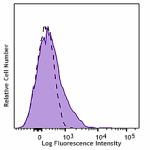
LPS-stimulated (day 3) BALB/c splenocytes were stained with ... -
Pacific Blue™ anti-mouse CD80
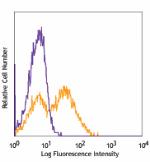
Anti-mouse IgM and CD40 (1C10) stimulated (4 days) C57BL/6 s... -
Brilliant Violet 421™ anti-mouse CD80
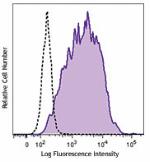
LPS-stimulated (day 3) C57BL/6 mouse splenocytes stained wit... 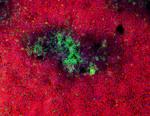
C57BL/6 mouse frozen thymus section was fixed with 4% parafo... -
Brilliant Violet 605™ anti-mouse CD80
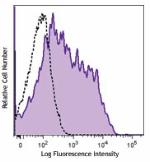
LPS-stimulated (day 3) C57BL/6 mouse splenocytes were staine... -
Brilliant Violet 650™ anti-mouse CD80
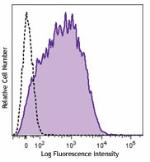
LPS-stimulated (day 3) C57BL/6 mouse splenocytes were staine... -
PE/Cyanine7 anti-mouse CD80
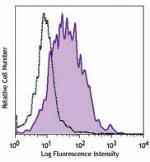
LPS-stimulated (day 3) C57BL/6 mouse splenocytes were staine... -
Purified anti-mouse CD80 (Maxpar® Ready)
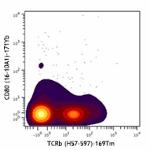
Mouse splenocytes were cultured with either media alone (top... 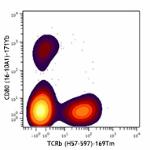
-
PE/Dazzle™ 594 anti-mouse CD80
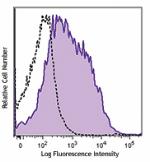
LPS-stimulated (day 3) C57BL/6 mouse splenocytes stained wit... -
APC/Fire™ 750 anti-mouse CD80
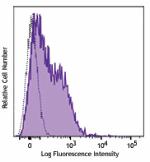
LPS-stimulated (3 days) C57BL/6 splenocytes were stained wit... -
Brilliant Violet 711™ anti-mouse CD80
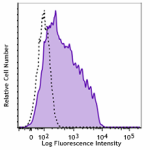
C57BL/6 mouse splenocytes were stimulated with LPS for 3 day... -
Brilliant Violet 510™ anti-mouse CD80
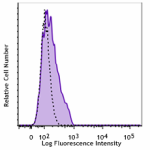
C57BL/6 mouse splenocytes were stimulated with LPS for 3 day... -
TotalSeq™-A0849 anti-mouse CD80
-
TotalSeq™-C0849 anti-mouse CD80
-
Ultra-LEAF™ Purified anti-mouse CD80
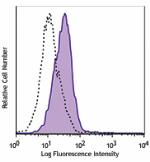
LPS-stimulated (3 days) BALB/c splenocytes stained with LEAF... -
Alexa Fluor® 594 anti-mouse CD80
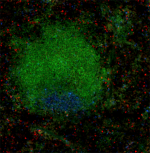
BALB/c mouse was subcutaneous injected with a million of 4T1... -
TotalSeq™-B0849 anti-mouse CD80 Antibody
-
PE/Fire™ 640 anti-mouse CD80
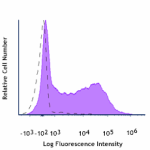
LPS-stimulated (day 3) C57BL/6 mouse splenocytes were staine... -
Spark NIR™ 685 anti-mouse CD80
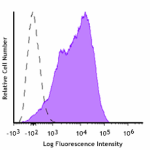
LPS-stimulated (day 3) C57BL/6 mouse splenocytes were staine... -
Spark Red™ 718 anti-mouse CD80 (Flexi-Fluor™)
-
Spark Blue™ 574 anti-mouse CD80 (Flexi-Fluor™)
-
Spark PLUS B550™ anti-mouse CD80 Antibody

LPS stimulated (3 days) C57BL/6 mouse splenocytes were stain... 
LPS stimulated (3 days) C57BL/6 mouse splenocytes were stai...
 Login / Register
Login / Register 






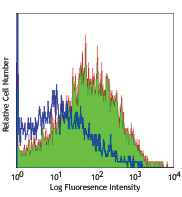
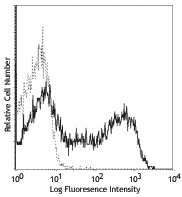
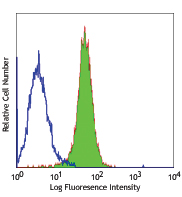
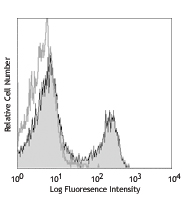



Follow Us